Mediterranean diet can reduce the risk of cardiovascular disease recurrence by nearly 30% within 7 years
- Normal Liver Cells Found to Promote Cancer Metastasis to the Liver
- Nearly 80% Complete Remission: Breakthrough in ADC Anti-Tumor Treatment
- Vaccination Against Common Diseases May Prevent Dementia!
- New Alzheimer’s Disease (AD) Diagnosis and Staging Criteria
- Breakthrough in Alzheimer’s Disease: New Nasal Spray Halts Cognitive Decline by Targeting Toxic Protein
- Can the Tap Water at the Paris Olympics be Drunk Directly?
Mediterranean diet can reduce the risk of cardiovascular disease recurrence by nearly 30% within 7 years
- Should China be held legally responsible for the US’s $18 trillion COVID losses?
- CT Radiation Exposure Linked to Blood Cancer in Children and Adolescents
- FDA has mandated a top-level black box warning for all marketed CAR-T therapies
- Can people with high blood pressure eat peanuts?
- What is the difference between dopamine and dobutamine?
- How long can the patient live after heart stent surgery?
Mediterranean diet can reduce the risk of cardiovascular disease recurrence by nearly 30% within 7 years
“The Lancet”: The Mediterranean diet is really healthy! Long-term large-scale clinical trials confirms that compared with low-fat diet, Mediterranean diet can reduce the risk of cardiovascular disease recurrence by nearly 30% within 7 years.
“Primary prevention prevents occurrence, and secondary prevention reduces risk.” The same is true for “number one killer” cardiovascular disease.
Secondary prevention of cardiovascular disease is to take steps to reduce the risk of recurrence and related mortality after a patient has a cardiovascular event.
When it comes to how to prevent cardiovascular disease before it happens, diet management must be a topic that cannot be avoided.
The Mediterranean diet is one of the currently recognized healthy eating patterns. Simply put, the Mediterranean diet is a style of eating in countries and regions around the Mediterranean Sea.
How to eat it? Eat more fruits, vegetables, beans, and grains every day, eat less red meat, try to eat white meat and fish for protein, and use olive oil as your main source of fat.
A randomized clinical trial (PREDIMED) in 2018 confirmed that, compared with a low-fat diet, a Mediterranean diet has advantages in the primary prevention of cardiovascular disease, reducing cardiovascular risk by 30% within 5 years [1].
However, until now, there have been no long-term, large-scale clinical trials demonstrating the effectiveness of the Mediterranean diet for secondary prevention of cardiovascular disease. But just recently, we finally had good news!
To compare the effectiveness of a low-fat diet and a Mediterranean diet for secondary prevention of cardiovascular disease, Javier Delgado-Lista’s team from Reina Sofia University Hospital in Spain conducted a long-term large-scale clinical trial (CORDIOPREV), and in “Liu The research results were published in the journal Leaf Knife [2].
The study pointed out that the secondary prevention effect of the Mediterranean diet on cardiovascular disease was better than that of the low-fat diet, and the intervention of the Mediterranean diet could reduce the risk of cardiovascular disease by 24.7-28.1% (HR 0.719-0.753).
Moreover, the preventive effect of the Mediterranean diet was more pronounced in men, with a 33.1% reduction in cardiovascular disease risk (95%CI 0.489-0.915, Log-rank p=0.013).
CORDIOPREV is a clinical study that explores the effect of the Mediterranean diet on secondary prevention of cardiovascular disease with the most extensive, longest follow-up and more reported events.

The study requires participants to be 20-75 years old with coronary heart disease, have no clinical events related to coronary heart disease in the past 6 months, follow a long-term dietary intervention, and have no serious disease or life expectancy below the length of the study.
From October 1, 2009 to February 28, 2012, a total of 1,850 eligible patients were screened. After exclusion, 1,002 patients were finally included in the CORDIOPREV study. The participants were mainly male (82.5%), with an average age of 59.5 years old.
After 1:1 randomization, 502 patients (50.1%) in the Mediterranean diet group and 500 (49.9%) in the low-fat diet group.
The CORDIOPREV study was followed up for 7 years, and at the end of the study on July 1, 2018, a total of 86 patients in the low-fat diet group gave up the dietary intervention, while only 46 patients in the Mediterranean diet group gave up.
Of the 132 (13.8%) participants who dropped out of the dietary intervention, 112 (84.8%) agreed to continue to complete follow-up in the form of electronic health records or phone follow-up, and the median follow-up time for overall participants (n=1002) was 2557 days.
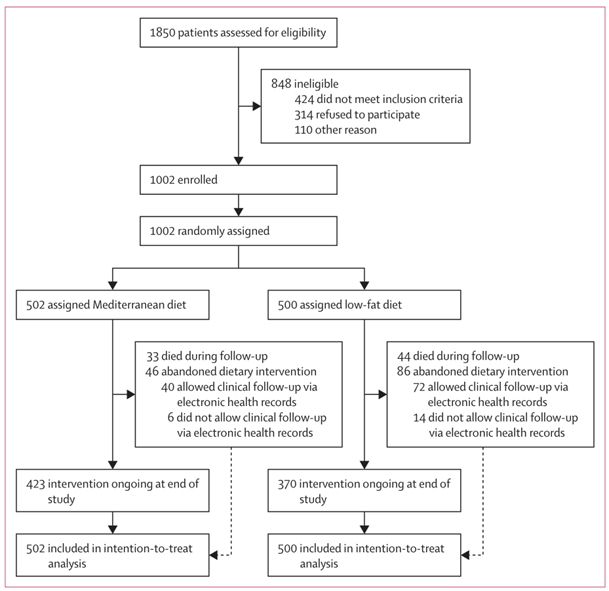
The CORDIOPREV study protocol and its key results
The meal plan for the Mediterranean diet group was as follows: at least 35% of total calories from fat (including 22% monounsaturated fatty acids, 6% polyunsaturated fatty acids, and less than 10% saturated fat); 15% protein; no more than 50 carbohydrates %.
The meal plan for the low-fat diet group was as follows: no more than 30% of total calories from fat (no more than 10% saturated fatty acids, 12%-14% monounsaturated fatty acids, 6%-8% polyunsaturated fatty acids); 15% Protein; Carbohydrates not less than 55%.
Statistics found that the compliance score of patients in the Mediterranean diet group was 8.78 (the highest standard of 14 points); while the compliance of patients in the low-fat diet group was 3.81 (the highest standard of 9 points).
Most of the participants’ dietary changes occurred during the first year of follow-up, with adherence increasing by 1.99 points in the Mediterranean diet group and 2.53 points in the low-fat diet group.
At the end of the study, patients in the Mediterranean diet group had significantly higher proportions of total fat intake, as well as intake of virgin olive oil, nuts and fish.
Specifically, the proportion of total fat intake increased from 37.4% to 40.5%, of which monounsaturated fatty acids increased from 18.4% to 21.4%, polyunsaturated fatty acids increased from 6.4% to 7.4%; virgin olive oil daily intake The amount increased from 31 g to 48 g; the weekly nut intake increased from 2.1 to 3.9 servings; and the weekly fish intake increased from 2.8 to 3.2 servings.
In addition, the intake of total carbohydrates (from 41.4% to 39.4%) and saturated fatty acids (from 9.0% to 7.9%) in the Mediterranean diet group showed a downward trend , while the intake of carbohydrates in the low-fat diet group increase in volume (from 41.7% to 45.5%).
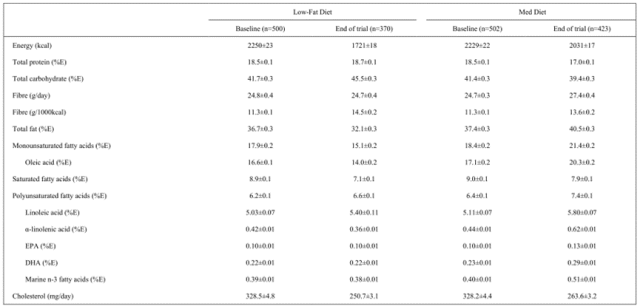
Outcomes of energy and nutrient intake in patients on a Mediterranean diet and a low-fat diet
The CORDIOPREV study was followed up to the seventh year, and a total of 198 major cardiovascular events were recorded, 87 (17.3%) in the Mediterranean diet group and 111 (22.2%) in the low-fat diet group.
The crude incidence rate for the Mediterranean diet group was 28.1 per 1,000 person-years (95% CI 27.9-28.3), while the crude incidence rate for the low-fat diet group was 37.7 per 1,000 person-years (95% CI 37.5-37.9).
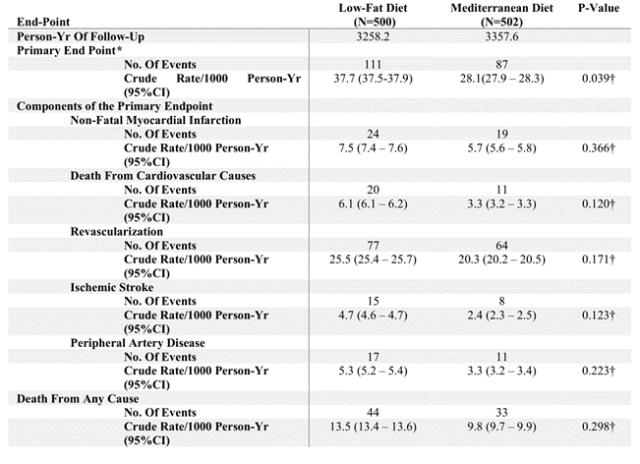
Primary endpoints, specific cardiovascular events, and overall mortality outcomes in the Mediterranean versus low-fat diet groups
For overall participants , the Mediterranean diet reduced the risk of cardiovascular disease by 26.6% compared with the low-fat diet group (HR = 0.734, Log-rank p = 0.032) ; in the male group , the Mediterranean diet also showed A more significant preventive effect than a low-fat diet, the risk of cardiovascular disease was reduced by up to 33% after the Mediterranean diet intervention (HR = 0.67, Log-rank p = 0.013).
However, no significant difference was found among the 175 women, but whether it is the error caused by the insufficient number of groups, or whether gender is also one of the influencing factors, needs to be further revealed in future research.
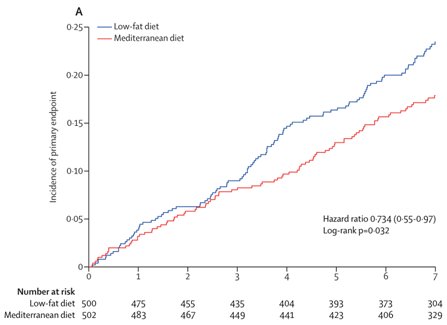
Kaplan-Meier curve of the primary endpoint event rate for the entire participant population
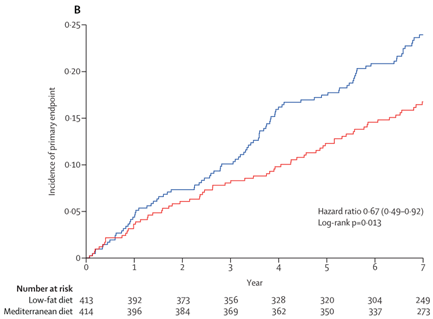
Kaplan-Meier curve of primary endpoint event rate in male participant population
Finally, through multivariate-adjusted COX regression analysis, the scientists found that the Mediterranean diet was superior to the low-fat diet for secondary prevention of cardiovascular disease in all models, with multivariate-adjusted hazard ratios (HR) for different models The range was 0.719 (95% CI 0.541-0.957) to 0.753 (95% CI 0.568-0.998).
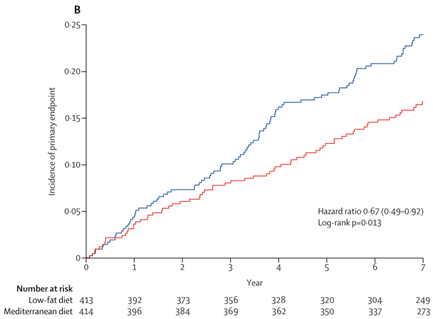
Multivariate Adjusted Hazard Ratios for Different Models
Overall, the CORDIOPREV study confirmed that the Mediterranean diet can effectively reduce the risk of cardiovascular disease, and has more advantages than a low-fat diet, providing an important basis for the adjustment of dietary recommendations and follow-up for patients with coronary heart disease in clinical guidelines.
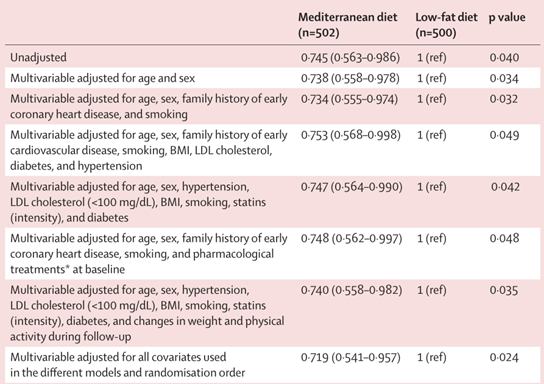
references:
1. Estruch R, Ros E, Salas-Salvadó J, et al. Primary Prevention of Cardiovascular Disease with a Mediterranean Diet Supplemented with Extra-Virgin Olive Oil or Nuts. N Engl J Med. 2018;378(25): e34.
2. Delgado-Lista J, Alcala-Diaz JF, Torres-Peña JD, et al. Long-term secondary prevention of cardiovascular disease with a Mediterranean diet and a low-fat diet (CORDIOPREV): a randomised controlled trial. Lancet. 2022 ;399(10338):1876-1885.
Mediterranean diet can reduce the risk of cardiovascular disease recurrence by nearly 30% within 7 years
(source:internet, reference only)
Disclaimer of medicaltrend.org
Important Note: The information provided is for informational purposes only and should not be considered as medical advice.



